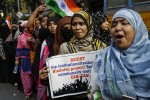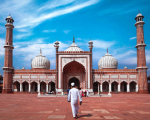On International Religious Freedom Day, Remember Those Who Cannot Practice Faith Freely
On a bright, beautiful autumn day earlier this month, I had the privilege of gathering with thousands of members of the Ahmadiyya Muslim community in the city of Zion, Ill. for the dedication of Fath-e-Azeem Mosque. The day marked a momentous occasion for this community of faithful Muslims, who – despite their focus on teachings of peace, love, tolerance, and justice – face terrible persecution in Pakistan, Afghanistan, and many other Muslim-majority countries of the world.
More than a century ago, the Scottish-Australian minister John Alexander Dowie founded Zion as a theocratic city based on the religious principles he preached, which included calling for the destruction of all Muslims. Halfway around the world lived Mirza Ghulam Ahmad, the founder of the Ahmadiyya movement, who taught a very different vision of truth: one founded on respect, tolerance, and love for all. With a remarkable combination of humility and boldness, Mirza Ghulam challenged Dowie to a “prayer duel” to establish which of the two men were correct in their prophetic vision. When Dowie ignored the challenge, Mirza Ghulam suggested they leave the dispute and their fate up to God. Whichever of the two should perish first, he said, would indicate God’s judgement in the contest. Despite being more than a decade younger and living in more affluent circumstances, Dowie died, destitute and disgraced, more than a year before Mirza Ghulam Ahmad. Ahmad’s followers took this as a sign that God had blessed their founder’s vision of tolerance and inclusion and had favored Mirza Ghulam with a victory in the “duel”.
For contemporary Ahmadiyya Muslims, the establishment of a beautiful new mosque in the city of Zion, once a bastion of Islamophobia and religious intolerance, represents a triumph of prayer over prejudice and love over hate. The mosque’s dedication, which gathered Ahmadis from around the world with members of the Zion community and representatives from many faith traditions, embodied their deep commitment to mutual respect among all religions. As Mirza Masroor Ahmad, the spiritual head of the Ahmadiyya community today, said in his remarks, “Defending all religions and establishing true freedom of religion and belief is, in reality, the foundation for establishing peace in the world.”
A similar perspective served as the impetus for the International Religious Freedom Act of 1998 (IRFA), which became law in the United States on October 27, 24 years ago today. My father – the late Congressman Tom Lantos and the only Holocaust survivor ever elected to the U.S. Congress – was among the members who worked to pass this landmark piece of legislation, which committed the United States to condemning violations of freedom of religion, belief, and conscience in its foreign policy, and to assisting other governments in promoting this fundamental right.
In the years since IRFA’s adoption, we have seen important progress for the international religious freedom movement. The creation of the State Department’s Office of International Religious Freedom (IRF), headed by an ambassador-at-large, and the establishment of the bipartisan U.S. Commission on International Religious Freedom have underscored America’s commitment. Governments from numerous countries around the world have joined this effort, with high-level ministerial meetings to advance religious freedom taking place since 2018. For the past two years, I have had the opportunity to serve alongside former IRF Ambassador Sam Brownback as Co-Chair of the International Religious Freedom Summit, which convenes a broad coalition of civil society groups dedicated to this cause and combines our collective advocacy efforts to achieve greater impact.
For all the positive movement, however, religious freedom globally remains in peril. The Pew Research Center has tracked international religious freedom since 2007, and its most recent report shows that government restrictions related to religion are at the highest levels since the study began. The total number of countries in the study with “high” or “very high” levels of restrictions rose in 2019 to 57 out of 198 (or 29%). Social hostilities involving religion have fallen somewhat, but 43 countries (or 22% of those included the study) still report “high” or “very high” levels.
Of course, we don’t need statistics to tell us what we know from staying updated on world events. We see the erosion of freedom of religion and belief in the persecution of the Ahmadiyya community in Pakistan, Rohingya Muslims in Myanmar, Yezidis in Iraq, Hazaras in Afghanistan, and in the genocide being committed against the Uyghurs of Xinjiang, China. We see it in the discrimination and terror facing Christians in places like Egypt, Nigeria, and Vietnam. We see it in Putin’s weaponization of the Russian Orthodox Church as one more propaganda tool and the danger facing religious leaders or groups who dare to stand against his ruthless war in Ukraine. We see it in the shocking rise of antisemitism globally. We see it in the violent crackdown on the streets of Iran against the courageous women fighting for the right to live by the dictates of their own consciences, not at the mercy of a theocratic state.
As we recognize International Religious Freedom Day and the adoption of the deeply significant IRFA legislation, we must call on more faith communities around the world to follow the example of my Ahmadi friends who daily live out their commitment to the idea that each person on this earth has a God-given right to choose what they believe and to practice those beliefs freely. Embracing this idea means doing more than preaching freedom of religion or even practicing tolerance. It means standing up to decry the rampant injustice and persecution facing millions of people of faith and those who seek freedom from having faith forced upon them. It means standing alongside people of all cultures and creeds to affirm that it is possible for prayer to triumph over prejudice. It means holding governments throughout the world accountable for defending the right to freedom of religion, conscience, and belief because it is a bedrock for peace and justice.







